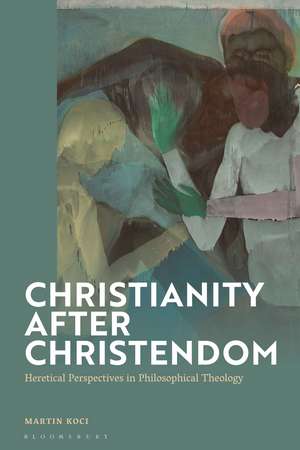Christianity after Christendom: Heretical Perspectives in Philosophical Theology
Autor Dr Martin Kocien Limba Engleză Hardback – 4 oct 2023
Preț: 509.20 lei
Preț vechi: 730.49 lei
-30% Nou
Puncte Express: 764
Preț estimativ în valută:
97.43€ • 101.74$ • 80.46£
97.43€ • 101.74$ • 80.46£
Carte tipărită la comandă
Livrare economică 15-29 aprilie
Preluare comenzi: 021 569.72.76
Specificații
ISBN-13: 9781350322639
ISBN-10: 1350322636
Pagini: 248
Dimensiuni: 138 x 216 mm
Greutate: 0.44 kg
Editura: Bloomsbury Publishing
Colecția Bloomsbury Academic
Locul publicării:London, United Kingdom
ISBN-10: 1350322636
Pagini: 248
Dimensiuni: 138 x 216 mm
Greutate: 0.44 kg
Editura: Bloomsbury Publishing
Colecția Bloomsbury Academic
Locul publicării:London, United Kingdom
Caracteristici
Presents Christianity as a way of 'being in the world', very much in line with the current focus in continental philosophy to relate philosophy and thought to the lived life
Notă biografică
Martin Koci is Associate Professor at the Catholic University of Linz, Austria. He is the author of Thinking Faith after Christianity (2020) for which he received the Book Prize for the Theological Book of the Years 2019-2020 from the European Society for Catholic Theology.
Cuprins
Introduction Part I: The Postmodern Ends of ChristianityChapter 1 Lost Credibility: Jean-François Lyotard's Critique of Meta-NarrativeChapter 2 Deconstruction: Jean-Luc Nancy and the Essence of ChristianityChapter 3 The Sense of the After: Jan Patocka and Post-Christian Epoch Part II: The Figures of the AfterChapter 4 Weak Christianity: Gianni VattimoChapter 5 Christianity without Religion: John D. CaputoChapter 6 Poetics of Anatheistic Christianity: Richard Kearney Part III: The Spirituality of Being in the WorldChapter 7 Christianity Interrupted: A Theological Experiment of Lieven BoeveChapter 8 Being Shaken Chapter 9 The Community of the Shaken Conclusion: Into the WorldNotes Index
Recenzii
Taking cues from recent figures working on the borders of theology and phenomenology, Koci pushes us toward the core of embodied religious existence without yet performing a phenomenological analysis, offering us a rich dialectical approach that seeks to appreciate both hermeneutical and phenomenological methods. Christianity is seen therefore as what it is, a way of life and not just a hermeneutical, or thought-based exercise.
